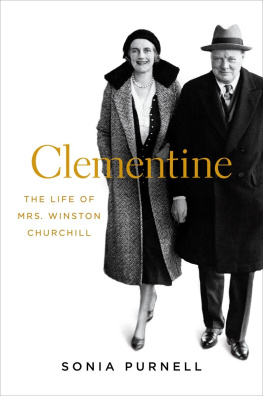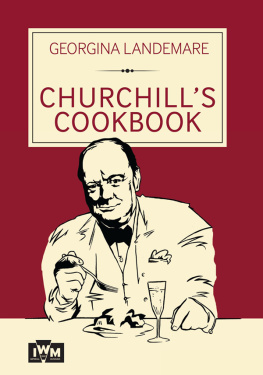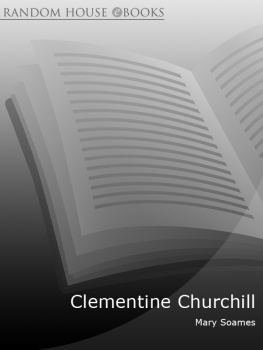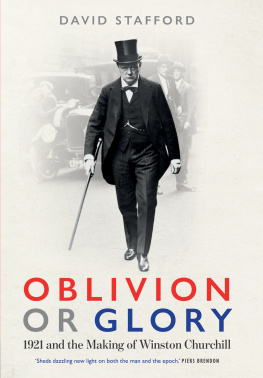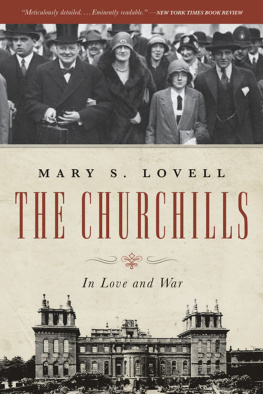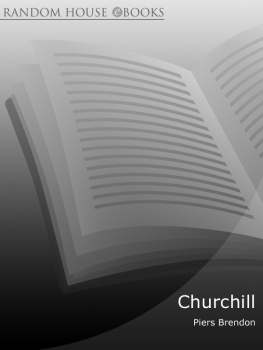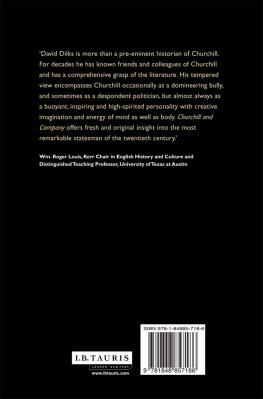Penguin supports copyright. Copyright fuels creativity, encourages diverse voices, promotes free speech, and creates a vibrant culture. Thank you for buying an authorized edition of this book and for complying with copyright laws by not reproducing, scanning, or distributing any part of it in any form without permission. You are supporting writers and allowing Penguin to continue to publish books for every reader.
of the photo section reproduced with permission of Curtis Brown, on behalf of the Broadwater Collection.
of the photo section reproduced with permission of The Master, Fellows and Scholars of Churchill College, Cambridge.
I send this token, but how little can it express my gratitude to you for making my life & any work I have done possible, and for giving me so much happiness in a world of accident & storm.
Winston to Clementine, on their fortieth wedding anniversary, September 12, 1948, Cap dAntibes
Introduction
L ate in the evening of Monday, June 5, 1944, Clementine Churchill walked past the Royal Marine guards into the Downing Street Map Room wearing an elegant silk housecoat over her nightdress. Still fully made up, she looked immaculate and, as always, serene. Around her the atmosphere was palpably tense, even frayed. She glanced at the team of grave-faced plotters busily tracking troops, trucks and ships on their charts. Then she cast her eyes over the long central table, whose phones never stopped ringing, to the far corner, where, as expected, she spotted her husband, shoulders hunched, face cast in agonized brooding. She went to him as she knew she must, for no one elseno aide, no general, no friend, however loyalcould help him now.
Clementine Churchill was one of a tiny group privy to the months of top secret preparations for the next mornings monumental endeavor. Fully apprised of the risks involved in what would be the largest seaborne invasion in history, she knew the unthinkable price of failure: millions of people and a vast swath of Europe would remain under Nazi tyranny, their hopes of salvation dashed. She also knew the ghosts that haunted Winston that night, the thousands of men he had sent to their deaths in the Dardanelles campaign of the First World War. She alone had sustained him through that disaster and the horrors of his time serving in the trenches on the Western Front.
Churchill had delayed the D-day operation for as long as he could to ensure the greatest chance of success, but now British, American and Canadian troops would in a few hours attempt to take a heavily fortified coastline defended by men who were widely regarded as the worlds best soldiers. Huge convoys were already moving through the darkness toward their battle stations off the coast of Normandy. Earlier that evening, Winston and Clementine had discussed the prospects of the gambits success, at length and alone, over a candlelit dinner. No doubt he had poured out his fears and she had sought, as so many times before, to stiffen his resolve. In the end, the command to proceed had been given.
Looking up now as she approached, Winston turned to his wife and said, Do you realise that by the time you wake up in the morning twenty thousand men may have been killed?
To the outside world Winston Churchill showed neither doubt nor weakness. Since he had declared to the world in June 1940 that Britain would never surrender, his was the voice of defiance, strength and valor. Even Stalin, one of his fiercest critics, was to concede that he could think of no other instance in history when the future of the world had so depended on the courage of a single man. What enabled this extraordinary figure to stand up to Hitler when others all around him were crumbling? How did he find in himself the strength to command men to go to their certain deaths? How could an ailing heavy drinker and cigar smoker well into his sixties manage to carry such a burden for five long years, cementing an unlikely coalition of allies that not only saved Britain but ultimately defeated the Axis powers?
Churchills conviction, his doctor Lord Moran observed while tending him through the war, began in his own bedroom. This national savior and global legend was in some ways a man like any other. He was not an emotional island devoid of need, as so many historians have depicted him. His resolve drew on someone elses. In fact, Winstons upbringing and temperament made him almost vampiric in his hunger for the love and energy of others. Violet Asquith, who adored him all her life, noted that he was armed to the teeth for lifes encounter but also strangely vulnerable and in want of protection.
Only one person was able and willing to provide that protection whatever the challenge, as she showed on that critical June night in 1944. Yet Clementines role as Winstons wife, closest adviser and greatest influence was overlooked for much of her life, and has been largely forgotten in the decades since.
Neither mousy nor subservient, as many assume her to have been, Clementine Churchill was so much more than an extension of her husband. Like him, she relentlessly privileged the national interest above her health and family; her list of extramarital achievements would put many present-day government ministers, speechwriters, charity chiefs, ambassadors, activists, spin doctors, MPs and hospital managers to shame. Unlike Winston, she was capable of great empathy, and she had a surer grasp of the importance of public image. In her trendsetting sense of style she was a precursor to Jackie Onassiswith her leopard-skin coats and colorful chiffon turbansand her skills as a hostess played a crucial role in binding America to the cause of supporting Britain. For all this and more, she was honored by three British monarchs, and by the Soviet Union. Just surviving, let alone shaping, what must surely count as one of the twentieth centurys most challenging marriages should surely be a notable triumph in itself.
Winston once claimed that after their wedding they had simply lived happily ever after. That is stretching the truth. There was never a break from the whirl of haste, excitement and perpetual crisis behavior, or to oppose privately his more noxious political beliefs; gradually she altered his Victorian outlook with what he called her pinko ideas and her support for womens rights. But however furiously they might have disagreed, she loved him and reveled in her union with a man so exciting and famous. For his part, he simply doted and depended on her.
Throughout the first three decades of their marriage, Winston and Clementine were united by a common project: making him prime minister. When that goal was achieved, their aim changed and became survival itself. In peacetime, despite her misgivings about his refusal to give up politics, they were jointly dedicated to his legacy. Not only did they weather repeated public and personal humiliation together, they overcame the bitterest of personal tragedies and survived the all-but-intolerable strains of being at the center of two world wars. In so doing they forged one of the most important partnerships in history. The question is not just what she did for him, but what could he have done without her?

